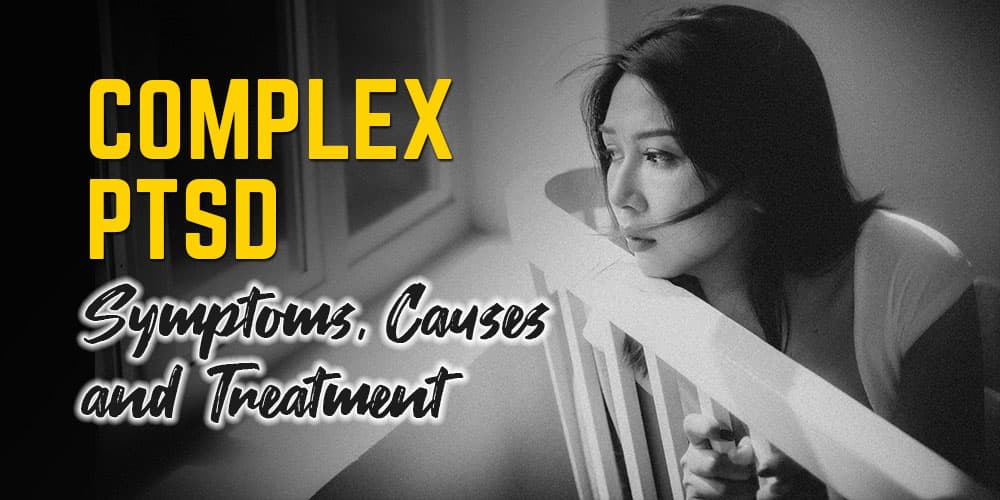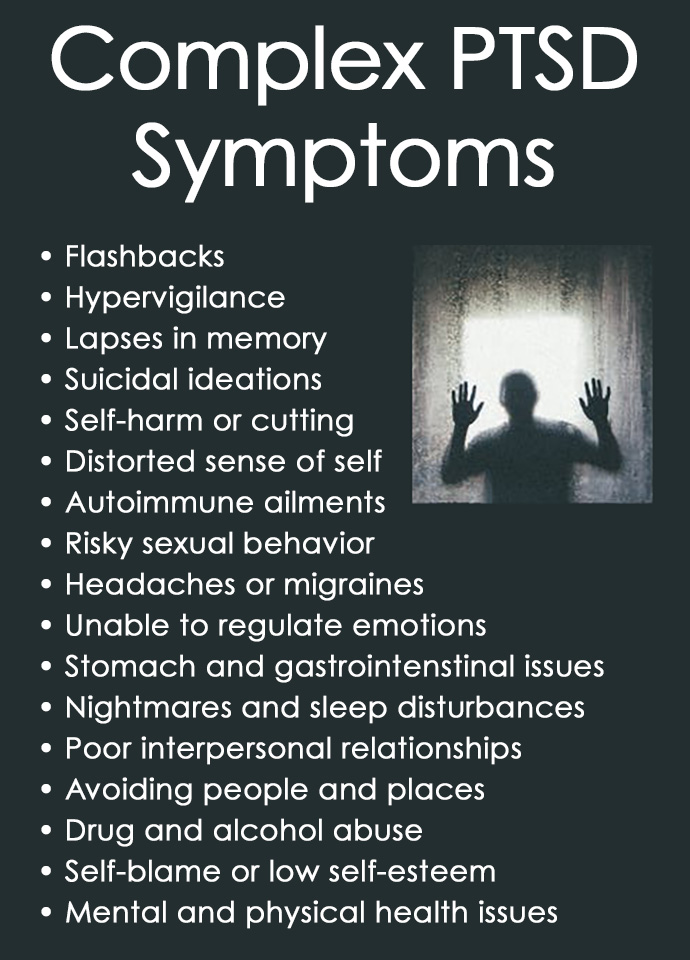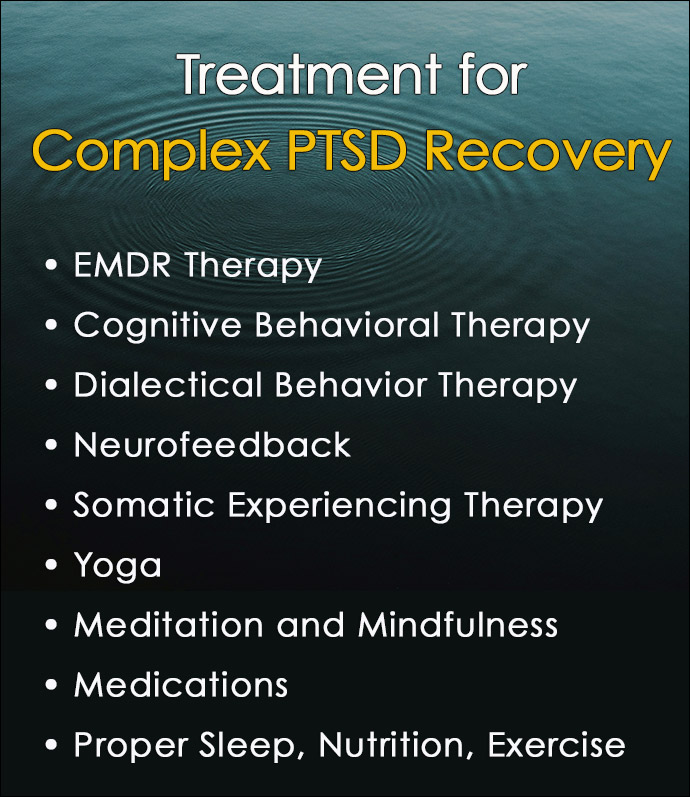
Complex PTSD symptoms are closely related to those of post-traumatic stress disorder although there are often differences in the causes of the condition.
Understanding the distinction between the two is necessary for identifying the most effective Complex PTSD treatment approaches.
What is Complex PTSD?
Complex PTSD, also known as C-PTSD, is one of several types of PTSD that develops after experiencing prolonged or repeated trauma over months or years.
The condition is considered a form of post-traumatic stress disorder (PTSD) but with variations in the causes, symptoms, and treatment.
C-PTSD generally involves intense feelings of shame, guilt, low self-esteem, avoidance, learned helplessness, interpersonal turmoil, and difficulties regulating emotions as a result of chronic interpersonal trauma.
This differs from traditional PTSD which is more commonly caused by one specific traumatic event. The chronic interpersonal trauma that results in Complex PTSD is often caused by other people rather events that are out of an individual’s control such as accidents and natural disasters.
Examples of Traumatic Events That Cause Complex PTSD
- Ongoing physical, emotional, or sexual abuse
- Chronic neglect in childhood
- Long-term captivity or kidnapping situations
- Exposure to war and large-scale conflicts
- Being a victim of, or witnessing ongoing domestic violence
Repeated traumatic events associated with C-PTSD cause changes in the structure and function of the brain, as well as stress hormones that have a profound impact on a person’s physical health and relationships.
What is the Difference Between Traditional PTSD and Complex PTSD?
The most significant differences between PTSD (Post-Traumatic Stress Disorder) and Complex PTSD are related to the causes, symptoms, and treatment approaches.
PTSD usually stems from a single traumatic event whereas Complex PTSD involves prolonged, repetitive trauma that creates additional symptoms.
Differences Between PTSD and C-PTSD
1. Causes
PTSD is often caused by a single traumatic event such as a natural disaster, accident, or a one-time assault.
Complex PTSD is generally caused by long-term, repeated trauma such as continued physical or emotional abuse, domestic violence, or childhood neglect.
2. Symptoms
PTSD symptoms are commonly experienced as flashbacks, nightmares, and a heightened state of awareness or caution.
Those are typical Complex PTSD symptoms although the condition can also manifest additional others, like trouble regulating emotions, having a negative self-concept, interpersonal struggles, feelings of shame or guilt, and somatic illness not related to a direct cause.
3. Treatment Approaches
PTSD treatment is usually focused on addressing a single traumatic event.
Complex PTSD treatment targets multiple traumatic events as well as rebuilding healthy emotional skills.
Complex PTSD Symptoms
When considering Complex PTSD symptoms, it’s common for people to have suicidal ideations, be impulsive, and engage in risky behaviors like self-harm (cutting), drug or alcohol abuse, and reckless sexual behavior.
Trauma disorders have a negative effect on the body and create physical symptoms in addition to emotional ones.
Many individuals suffer from physical health problems in the form of chronic pain, gastrointenstinal issues, headaches or migraines, and hormone imbalances due to prolonged activation of the body’s stress response.

17 Symptoms of Complex PTSD
- Flashbacks
- Headaches or migraines
- Unable to regulate emotions
- Hypervigilance
- Lapses in memory
- Stomach and gastrointenstinal issues
- Nightmares and sleep disturbances
- Distorted sense of self
- Poor interpersonal relationships
- Avoid people and places
- Drug and alcohol abuse
- Self-blame or low self-esteem
- Mental and physical health issues
- Suicidal ideations
- Self-harm or cutting
- Autoimmune ailments
- Risky sexual behavior
Complex PTSD symptoms can be grouped into four categories with similar traits.
1. Re-Experiencing Symptoms
Intrusive thoughts, nightmares, and flashbacks that cause a person to re-live their trauma. Re-experiencing symptoms cause intense emotional and physical reactions like panic attacks.
2. Avoidance
People with C-PTSD tend to avoid people, places, situations, or memories that remind them of their traumatic experiences that cause difficult emotional reactions. Emotional avoidance helps to prevent processing negative thoughts and feelings.
3. Hypervigilance
Individuals who are hypervigilant are easily startled or aroused and constantly stay on guard mentally and physically. They may also engage in self-destructive behavior and have trouble concentrating or sleeping.
4. Cognitive and Mood Issues
These types of issues cause a person to block out memories of their trauma, isolate from others, and have negative thoughts about themself or the world. They may accept personal blame for their problems and experience unhealthy emotions that lead to anxiety and depression, and substance use.
What Causes Complex PTSD?
The cause of Complex PTSD is often due to chronic interpersonal trauma that continues for months or years during the developmental stages of early childhood or adolescence.
Childhood trauma in adults that triggers Complex PTSD is frequently caused by parents, caregivers, and other people who repeatedly violated physical or emotional trust and personal boundaries.
Examples of Complex Trauma
1. Childhood Emotional Abuse and Neglect
One of the most common causes of Complex PTSD for young children and teens occurs from being repeatedly threatened, yelled at, degraded, or neglected by parents, caregivers, and other authority figures.
2. Childhood Physical or Sexual Abuse
Ongoing sexual, physical, or emotional abuse from a caregiver, authority figure, or trusted person during the developmental stages of a child can lead to C-PTSD.
3. Domestic Violence
Domestic violence pertains to repeated and ongoing emotional abuse, physical assault, or controlling manipulation from a spouse or intimate partner.
4. Abduction and Captivity
Complex trauma can be the result of being abducted, trafficked, or kept in captivity. This usually includes physical confinement and ongoing emotional or physical violence over months or years.
Interpersonal trauma from these examples is more commonly a cause of C-PTSD vs PTSD because chronic violations by trusted loved ones or authority figures creates a deeper sense of loss, hopelessness, and self-blame than trauma caused by a single event.
The timing of the traumatic experience is also important. Chronic abuse that occurs in childhood while emotional regulation skills are still developing has a more profound impact on the psyche and a person’s personality.
Does the DSM-5 Recognize Complex PTSD?
Complex PTSD is not an official diagnosis in the DSM-5 and it is currently a subtype of PTSD and not its own diagnosis in the Diagnostic and Statistical Manual of Mental Disorders.
However, Complex PTSD is listed in the ICD-11 (International Classification of Diseases, 11th revision) under the diagnosis of “Disorders specifically associated with stress.”
Complex PTSD is not its own diagnosis in the DSM-5 because it shares the main features of PTSD including intrusion, avoidance, and negative alterations in cognition, mood, and hyperarousal.
The American Psychiatric Association does not consider C-PTSD to be distinct enough for its own separate diagnosis.
Many mental health professionals argue that Complex PTSD should be a separate diagnosis in future DSM classifications because it has additional symptom clusters such as emotional regulation difficulties, a negative self-concept, and interpersonal problems related to the chronic trauma that causes it.
These additional symptoms will have a big impact on identifying the most effective treatment approaches.
The ICD-11 includes Complex PTSD as a sibling disorder to PTSD under “Disorders specifically associated with stress” because it has some, but not all, of the features of PTSD.
There is debate among mental health professionals that C-PTSD should have its own distinct diagnosis in future DSM classifications.
Bessel van der Kolk is a researcher, psychiatrist, and author of the book, “The Body Keeps the Score.”
He has strongly advocated for adding a Complex Trauma and Disorders of Extreme Stress (DESNOS) Diagnosis to the DSM-5 to improve diagnosis and treatment outcomes for C-PTSD.
How is Complex PTSD Diagnosed?
Complex PTSD is diagnosed through a clinical assessment by a mental health professional, although there is no single test for the condition.
A C-PTSD assessment focuses on identifying a person’s traumatic experiences, a timeline of when the symptoms started, and the nature, frequency, and severity of symptoms.
A doctor will screen for PTSD symptoms that include flashbacks, nightmares, and hypervigilance. If sufficient criteria are not met, a PTSD diagnosis is ruled out.
Doctors will also assess for additional Complex PTSD symptom clusters that include emotional regulation, self-concept, interpersonal issues with intimacy, trust, social interaction, and a somatic response to trauma like stomach pain and headaches.
It’s important to evaluate differential diagnoses and rule out causes like bipolar disorder, depression, or anxiety disorders to ensure the symptoms are due to prolonged trauma exposure.
Finally, a doctor will refer to the ICD-11 criteria for “Disorders specifically associated with stress” to see if the clinical picture aligns with the Complex PTSD subtype.
Getting an accurate diagnosis helps guide the most appropriate and successful Complex PTSD treatment.

Treatment for Complex PTSD Recovery
Treatment for Complex PTSD recovery requires a comprehensive approach that often includes medication, psychotherapy, evidence-based modalities, and holistic therapies.
C-PTSD Treatment Methods
- Eye Movement Desensitization and Reprocessing (EMDR)
- Cognitive Behavioral Therapy (CBT)
- Dialectical Behavior Therapy (DBT)
- Neurofeedback
- Somatic Experiencing Therapy
- Yoga
- Meditation and Mindfulness
- Medications
- Proper sleep, healthy nutrition, and regular exercise
Medications
Anxiety and depression medicines such as selective serotonin reuptake inhibitors (SSRIs) or serotonin–norepinephrine reuptake inhibitors (SNRIs) may be prescribed to help regulate neurotransmitters like serotonin that affect mood.
Others may be used to treat nightmares, sleep issues, depression, ADHD, and chronic pain.
Psychotherapy
Talk therapy is essential for an individual to understand how to process their trauma and challenge negative thought patterns. The goals are to reduce avoidance, process anger, grief, and learn emotional regulation techniques.
Common therapies include:
Cognitive Behavioral Therapy (CBT) works to reframe negative thoughts and self-blame.
Dialectical Behavior Therapy is useful for learning mindfulness, distress tolerance skills, and emotional regulation.
Eye Movement Desensitization and Reprocessing (EMDR) uses eye movements to process traumatic memories.
Neurofeedback Therapy helps to manage negative thoughts and triggers related to trauma memories.
Yoga is effective for getting in touch with the body and overcoming physical symptoms in the body caused by trauma.
Meditation and mindfulness are excellent ways to calm the mind and increase focus and attention on the present moment instead of living in the past where trauma resides.
Lifestyle changes help treat C-PTSD and include a proper sleep schedule, regular exercise, healthy nutrition and avoiding mood-altering substances like drugs and alcohol.
Support groups are therapeutic and offer a like-minded community of others in trauma recovery.
Complex PTSD symptoms can be challenging and pervasive, so identifying the causes and most effective treatment approaches for each individual are necessary for a successful recovery.
Related Posts
- June is PTSD Awareness Month
Because trauma impacts so many people, June is recognized every year as PTSD Awareness Month.…
- Types of Trauma Disorders Symptoms and Therapy
There are a number of different types of trauma disorders that encompass various psychological conditions…
- Secondary Trauma and Traumatic Stress
Secondary Trauma, also known as Secondary Traumatic Stress, is a mental health issue that affects…
